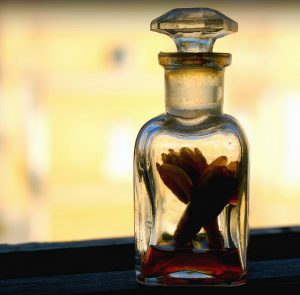Lectionary Reflection for the Fifth Sunday in Lent, Year C
March 13, 2016
Jesus said, “Leave her alone. She bought it so that she might keep it for the day of my burial. You always have the poor with you, but you do not always have me.” John 12:8
What a contrast between the way that Mary and Judas approach life! Mary spends her time, focus, and resources on Jesus. Judas, on the other hand, is calculating and cunning in his suggestion of how Mary could have better used her resources, i.e. to give the money to the poor. On the surface his response might carry water, but the fourth evangelist makes it clear that Judas’ real motivation is self-interest and greed. I don’t know about you, but if a director was assigning parts for this little drama, I’d much rather play Mary than Judas. I’m pretty sure most of us would  rather pour costly perfume on Jesus and see ourselves worshiping him extravagantly instead of acting like a greedy, selfish traitor that seems to be Judas’ lot in life. But would we do so when it comes right down to it?
rather pour costly perfume on Jesus and see ourselves worshiping him extravagantly instead of acting like a greedy, selfish traitor that seems to be Judas’ lot in life. But would we do so when it comes right down to it?
That perfume was worth a lot of money! By today’s standards it would be worth somewhere between $20,000 – $30,000. According to the 2013 US Census, that would cover about half of the median family income ($53,657). Put in those terms, would it really be so easy to pour that amount of money on someone’s feet, even if those feet did belong to the Son of God?
I can’t get Jesus’ response out of my mind this week: “Leave her alone. She bought it so that she might keep it for the day of my burial. You always have the poor with you, but you do not always have me.” This response is all too often “cherry-picked” and misapplied to imply that Our Lord believes poverty is a fact of life, and so we are absolved from working to stop injustice and economic inequality. The entire biblical witness offers enough ammunition to obliterate that pitiful attempt to twist Jesus’ teaching on social justice and water down discipleship.
In fact, one might make the argument that we don’t really have the poor WITH us at all. Sure we may wring our hands at the global poverty we see in photographs or hear about in news stories, and these may inspire us to write a well-meaning (and much needed) check from our own abundance. But WITH the poor? How many of us live among and regularly share life with those experiencing poverty? How much of our sharing of resources is “transactional” rather than “relational”? Could Jesus be up to something else here?
From where the reading appears in John’s gospel we know Jesus is heading for Jerusalem and that his time is short. Tensions with the religious leaders are escalating. Crowds who have witnessed his miracles are growing, and surely the poor and destitute are among them, if not the majority. Jesus is about to be handed over to a gruesome and shameful death because of humankind’s sinfulness. As Word made flesh, Jesus is about to show how amazing is divine mercy and how uncommon God’s sense of justice. It seems that Mary is the only one who truly “gets” the import of the events unfolding.
Mary somehow grasps the true meaning of costly grace and lavish love. She puts all that she has into her worship of Jesus on this night, even  drying his feet with her hair — in that day and age a scandalous interaction between a woman and man not her husband. She becomes completely vulnerable, in a sense declaring her complete dependence on and allegiance to this prophet of an upside-down, inside-out way of being. She was all in for whatever was to come.
drying his feet with her hair — in that day and age a scandalous interaction between a woman and man not her husband. She becomes completely vulnerable, in a sense declaring her complete dependence on and allegiance to this prophet of an upside-down, inside-out way of being. She was all in for whatever was to come.
Can you smell that sweet scent of devotion, of a life broken open and poured out for Jesus? Can you calculate the cost of the grace and love and mercy in denarii or dollars, drops of precious oil or drops of blood poured out for you and for me, for this entire beautiful, broken world? Yes, the life poured out in service and in worship of Christ is a costly one. But so is the grace that sets us free to truly live. Go ahead: break yourself open and destroy the illusions that keep you confined and that cloud your vision. Pour yourself out in praise, prayer, and purpose. Live your one precious life in a way that leaves nothing held back.
In Worship
If someone in your congregation uses essential oils, see if you can access some Spikenard anointing or essential oil to use in during worship in a diffuser. If you have people for whom strong scents are problematic, consider instead mixing a few drops in a carrier oil (olive oil is a good one) and offering a prayer and anointing during worship as a sign of devotion, praise, and commitment to living a life “poured out” for Jesus.
With Youth
When the going gets tough; the tough stay faithful. Well, that’s not exactly how the saying goes, but Paul in his letter to the church at Philippi, is encouraging the faithful to keep on heading for the prize found in Christ Jesus. Nothing is worth more, and Paul should know; he is well born, a Roman citizen, a faithful Jew, and full of zeal and righteousness. Yet, none of that ultimately mattered. All that matters to him is Jesus, his Lord and Savior. In this election year in the United States, many candidates are making appeals for our votes and our allegiance. Youth are aware of these competing claims. Consider a conversation about what it means to be faithful as a citizen. Ultimately our citizenship is in heaven, but we are also charged with responsibly evaluating candidates in light of how well their goals and platforms align with Jesus’ teachings and the great love command. Check your denomination’s website or advocacy pages to see if there are materials available to help you facilitate this conversation. The Evangelical Lutheran Church in America, for example, has ELCAvotes! to help promote prayer and conversation. Here’s a short article shared by Sojourner’s about Pope Francis’ call to a year of mercy and how that can inform our conversations about the 2016 election. Click here for a short article entitled “4 Tips for Following Jesus in Election Season.”
With Children
God Gives Water and Makes a Way
In the reading from Isaiah this week, the prophet speaks of God being on the verge of doing a new thing, saying “I will make a way in the wilderness and rivers in the desert. The wild animals will honor me, the jackals and the ostriches; for I give water in the wilderness, rivers in the desert, to give drink to my chosen people, the people whom I formed for myself so that they might declare my praise.”
Water is necessary to sustain life. Our bodies are made of 50-65% water (adult) and up to 75% (infant). We need clean water to survive. Most people in our congregations have ready access to plenty of water, so we tend to take it for granted. Share a simple story about people who lack access to clean water. It could be something about the poisoned water in Flint, Michigan, or about the need for wells in many parts of Africa so that people (mostly women and children) do not have to walk miles for clean water).
Tell the children that we can all do something to help make water more accessible for more people. First, we can take care with our own water use and give thanks every time we use the faucet or drinking fountain. We can also share our resources to make water more accessible. Take up a noisy offering (buckets or big tin cans) to benefit a water cause, and then have the children bring it forward for a special blessing. Give praise and thanks to God for the gift of water.
(Photos: Paul Kussrow, Juan Antonio F. Segal, and Samantha, Creative Commons. Thanks!)